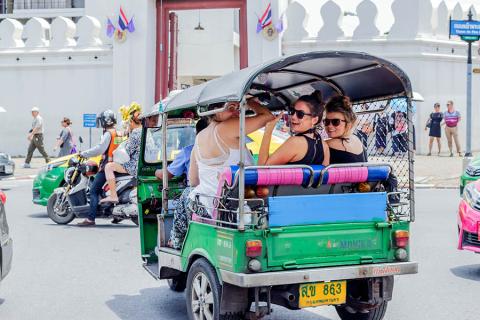
Do I need travel insurance?
You’re planning a big trip, you’ve saved for a while to make this trip possible and you’re looking forward to heading off. You haven’t arranged anything yet, but at the back of your mind you’re wondering, “Do I need travel insurance?”
The answer is yes. And although there are plenty of misperceptions about travel insurance, sadly people don’t realise the consequences of being uninsured until it’s too late. When you think of the cost of round the world flights or a tailor-made trip, it can be comparable to buying a car. You’d never leave your car uninsured, so why leave your holiday costs unprotected?
So what does travel insurance actually offer?

It’s worth knowing that travel insurance protects you in a few key areas:
- Financial protection before you travel and during your trip
- Medical cover whilst you’re away
Travel insurance policies are designed to compensate for any non-refundable pre-booked costs of your trip in the event that you can’t travel or have to cut your trip short. Medical cover guarantees emergency treatment abroad and the cost of repatriation to the UK if you become seriously unwell or injured. Contrary to what you might expect; in the UK the number one claim on travel insurance is actually for cancellation, not medical cover.
Additionally, most travel insurance policies also cover:
- Personal liability
- Personal accident
- Travel delay
- Personal effects and baggage cover, plus legal aid
Let’s look at each of these in a little more depth, starting with financial protection.
1. Financial protection - how is my money protected?

When booking flights or a tailor-made holiday, aspects of your trip are non-refundable once paid, including most flights. The airlines own conditions absolve them from offering a refund except in extreme situations, so it’s always safest to protect your booking in the event that you can’t travel.
If you need to cancel your trip
If you or a travel companion get sick or you experience a bereavement of a close relative, you may unexpectedly be prevented from travelling. If you put in place good travel insurance from the moment you pay for your trip, cancellation cover will protect your money and refund your costs. Without this protection, you’re likely to lose a percentage of what you’ve already paid.
If you need to come home early
Whilst you’re away, if something unexpected happens (you get sick or need to return home urgently), the curtailment element of travel insurance kicks in. This refunds you for any part of your trip you’re unable to take or the cost of an unused flight home in an emergency.
2. Medical cover

For your well-being and safety, medical cover is the most crucial part of any travel insurance policy.
This covers you for the full cost of medical treatment abroad, with a ceiling of millions of pounds. You’ll have 24/7 access to an emergency Medical Assistance company who can speak your language and the local language, to make sure you get treated.
Medical cover also includes the cost of repatriation (bringing you home from abroad), which can be expensive. In some situations, repatriation is the best option to guarantee you receive the best quality care as quickly as possible and it allows you to recuperate in comfort in your home country.
You may be thinking, ‘Why should I buy travel insurance? Surely in an emergency they have to treat me, regardless?’ And in the UK, you’d be right; that is what would usually happen with the NHS if a foreign citizen was taken ill whilst visiting. However, other countries operate different healthcare systems and few offer universal health care that’s free at the point of delivery. Outside of Europe, few countries have reciprocal healthcare arrangements with the UK, not even America - where health care costs can mount up if you’re uninsured.
ABTA: “4 out of 10 ‘Millennials’ travel uninsured
Based on research conducted in 2017, ABTA discovered that 40% of young people are travelling abroad uninsured every year, under the assumption that the British Consulate will assist with any medical fees they incur.
The simple fact is that in many places, no matter the severity of your injury, you may not be able to access adequate treatment without paying upfront, either with cash or by credit card or – thankfully – by providing your travel insurance policy details.
Contrary to what a lot of people believe, the British Consulate cannot help you with unexpected medical costs incurred abroad because you were uninsured. Having cover in place can be a lifesaver and a money saver.
Here’s an example of how insurance would assist with the costs of unexpectedly re-booking a flight:
Whilst horse riding on holiday a traveller fell off and broke a few ribs and his collarbone. Medically, there wasn’t much that could be done other than taking things easy, supporting his arm in a sling and waiting for time to heal the bones.
When he arrived to board his homebound flight, the airline required him to speak to their doctor. He was denied boarding because the airline's terms state that in the case of broken ribs, a passenger must be certified as fit to travel by a doctor in case they are at any risk of puncturing a lung at altitude. If that happened, it would create a mid-flight emergency and cause the plane to divert. Beside the potential risk to this passenger’s health, the airline would have to compensate the other travellers for the inconvenience. So in their opinion, it was better to prevent him from boarding than to take a risk.
With travel insurance, this may still be a frustrating situation, but it certainly isn’t expensive, since insurance would cover the cost of his unused flight.
3. What the other elements of your policy cover you for

Personal liability
This section covers you if you injure someone or damage someone else’s property whilst abroad. Travel insurance has paid out for claims where a traveller had caused a flood in an expensive 5 star hotel or when another traveller accidentally wounded someone who was sunbathing on a beach!
Personal accident
If you’re involved in an accident like a car crash, this pays out. Gruesome as this sounds, it would pay out a lump sum in compensation if you were permanently disabled, for example by losing a limb or an eye. And if the worst were to happen, it pays a lump sum to your relatives if you die.
Travel delay
Just to clarify - this is if the flight is delayed, not if you’re delayed getting to your flight!
Baggage and gadget cover
It’s useful to know what you can and can’t expect in terms of cover for possessions. The short story is this; you’re better off insuring expensive items like jewellery or gadgets under a separate policy.
On standard travel insurance policies including Travel Nation’s, you’re covered if your bag is lost or delayed in arrival by the airline. You’ll be able to make a fixed-amount claim for the cost of buying essential clothing and toiletries.
When it comes to tech, many policies have a total cover limit of around £250 for gadgets. That doesn’t cover replacing an iPhone, SLR camera or a top-end laptop, plus you need the original VAT receipt to make a claim for your lost gadget (so second-hand devices wouldn’t be covered).
Your options to cover gadgets are:
- Take out separate gadget insurance OR
- Extend your home contents insurance to cover gadgets abroad
Particularly in poorer parts of the world, cameras, laptops and smartphones are stolen to order. Rather than constantly worrying about gadgets, take precautions; cover them with the right insurance and consider using an online service to back up your photos whilst you’re away.
What are the alternatives to buying travel insurance?

For peace of mind, there is no alternative to travel insurance. When you’re in need of medical cover, a good travel insurance policy is your only option.
What cover do I have if I pay for my holiday/flights on a credit card?
Under the UK Credit Act, if you buy flights or a holiday on a credit card and the airline or operator goes bust, your credit card provider will help you reclaim your costs. Besides this, credit cards offer something called Travel Accident Insurance which pays out a lump sum if you’re involved in a plane crash.
Credit cards don’t offer medical cover so any protection is purely financial. Your card provider will not compensate you if you miss your flights, can’t travel, lose your bags or need to come home early. The only credit cards that may cover you for medical treatment abroad are the premium ‘concierge services’ like Amex’s Centurion card or Natwest’s Black card.
Am I covered if I use travel insurance that comes with my bank account?
Sometimes, yes. The insurance that comes with your bank account can be adequate but you must check the specific levels of cover included by default. If you’re taking a tailor-made trip with flights, hotels and tours, make sure any policy covers the full expense of your trip.
If you’re going to be doing any activities, check that they are included. Some high adrenaline activities may not be included by standard, but the policy can be extended if need be to cover them.
Some key activities covered as standard by Travel Nation’s policy
Here’s an idea of some common activities that are covered as standard on Travel Nation’s policy – check with your own provider if you already have a policy.
You can check the full list of activities Travel Nation’s policy includes here
Our policy also covers you for trekking at altitude, for example, the Inca Trail to Machu Picchu.
- Bubble diving
- Bungy jumping
- Dune bashing
- Guided glacier walking
- Hot air ballooning
- Horse riding
- Jet boating
- Jet skiing
- Parascending
- Safari & Gorilla tracking
- Scuba (up to 40m)
- Surfing
- Tree canopy walks
- Tubing
- Water skiing
- Whitewater rafting
- Ziplining
- Zorbing
Action points – what to do next
- If you have paid for your trip – take out travel insurance now to protect the full cost of your booking if you are suddenly unable to travel
- If you are about to travel – ensure you have a sufficiently comprehensive travel insurance policy and that you understand exactly what limits and activities it covers, especially:
- Total value of cancellation/curtailment cover
- Total value of gadget cover
Do you need travel insurance?
We strongly recommend that you take out adequate insurance to cover both your financial and medical costs. There are many travel insurance products that could fit your needs, including Travel Nation’s own policy which is designed to cover exactly the kind of trips we commonly sell.
For more information, ask your Travel Nation consultant, call us on 1273 320 580 or see travelnation.co.uk/insurance for a link to buy cover.

About the author Bryony Dunn
Marketing Manager
Bryony is an explorer in every sense of the meaning. In 2013 she took the plunge, quit her marketing job and decided to face down her lifelong panic disorder to begin life as a freelance digital nomad. Journeying all over Asia, for years she earned her keep writing for travel brands. Almost by accident, she ended up in Cali, Colombia where she discovered a remarkable (as yet latent) talent for Salsa dancing. After spending a year in sequins shimmying from dance show to dance show, she returned to the UK, tanned, toned and ready to settle down. Bryony joined Travel Nation as a round the world specialist in 2016 and is now the Marketing Manager, with a little salsa on the side.















